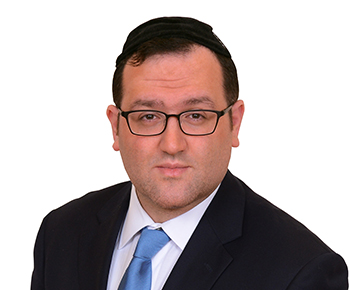
Eli Gerstner
Giving his testimony to USC Shoah Foundation in 1998 literally changed Hyman Schwartzblatt’s life.
Schwartzblatt’s grandson, Jewish music producer and composer Eli Gerstner, said Schwartzblatt told his family almost nothing about his experiences during the Holocaust. And when he did happen to make an offhand comment about his survival, they never knew what to make of it. What was the truth?
But when an interviewer and videographer from the then-titled Survivors of the Shoah Visual History Foundation came to film an interview with him about his life before, during and after the Holocaust, Schwartzblatt transformed.
“He says it opened up a wall he didn’t know existed,” Gerstner said.
For four and a half hours, Schwartzblatt spoke about his life, from his childhood in Wlodzimierz, Poland, to his escape from the Wlodzimierz ghetto and a prison and activities with the Shitov Otriad resistance group. Gerstner said the family was stunned to hear his incredible story of survival, especially because of his quiet, unassuming personality.
“It changed how we all looked at him. He was like Superman,” Gerstner said. “No human being could survive this and still be like our zayde [grandfather].”
After the interview, Schwartzblatt was a changed man. He became more open and outgoing with his family and began remembering and sharing even more details about his experiences. He also insisted on sharing his story with as many people as possible – no visitor leaves his house without hearing a few stories, Gerstner said, and his children, Schwartzblatt’s great-grandchildren, look forward to talking with him every weekend.
Recently, the family reconnected with USC Shoah Foundation, when staff reached out to Gerstner for permission to use a song he composed and produced for the Yeshiva Boys Choir in a promotional video for IWitness. The lyrics of the song, “Koli Sh’ma,” are especially appropriate; they implore the listener to “please hear my voice.” Gerstner said it is his mission to spread happiness and peace through his music.
“It was my pleasure to have one of my songs be involved in any way,” Gerstner said. “It’s definitely very apropos.”
After giving his testimony, Schwartzblatt felt he had survived the Holocaust for a reason, Gerstner said: to share his story with future generations of the world.
Testimony can help safeguard against denial of the Holocaust, and influence people who might otherwise be inclined toward hatred, he said. It can also raise awareness about atrocities that happened in the past – and their similarity to atrocities that are happening today.
“When you hear these stories you can’t believe this happened to our parents’ or grandparents’ generation – that regular human beings did these horrible things,” Gerstner said. “We don’t want this to happen ever again, not just to Jews but every human in the world. But evil exists and existed, and we need to make the world a better place.”
[[nid:10474]]